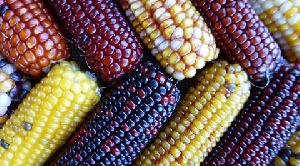 Maize is one of two crops already traded on the Exchange
Maize is one of two crops already traded on the Exchange
The Ghana Commodities Exchange (GCX) is expected to add rice, as a third commodity after maize and soya, to the crops traded on the Exchange. This follows completion of a feasibility studies into the local rice market.
This is expected to lead to an increase the production of rice in the country as well as its sale, both locally and for export.
Currently, Ghana produces 450,000 tons of rice annually. This is far lower than the millions of tons imported into the country every year, which amounts to almost a billion dollars in terms of the import bill incurred.
Challenges that confront local rice producers include the lack of quality control mechanisms, lack of access to credit, low-level infrastructure such as warehousing, unregulated pricing, and lack of policies to effectively regulate the entire rice value chain. Trading in rice on the GCX is expected to address most of these challenges.
GCX is also planning to implement the use of Electronic Warehouse Receipts for the purposes of securing short term finance from member financial institutions by 2020.
Meanwhile, the trading of sorghum and sesame seed is scheduled to begin in September.
Over the ten months following the launch of Ghana Commodity Exchange (GCX), a total of 687.51 metric tonnes (MT) of maize and 21.64 MT of soya bean have been traded, as at the end of trading week August 2, 2019, year to date.
Maize currently serves as the premier crop in terms of area planted and accounts for 50-60 percent of total cereal production, while being the second largest commodity crop in the country after cocoa.
GCX Central Depository
GCX currently maintains a Central Depository or Registry of warehouse receipts which guarantee product quality and quantity.